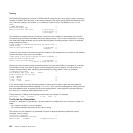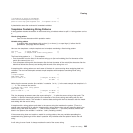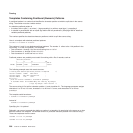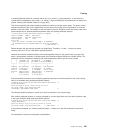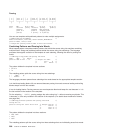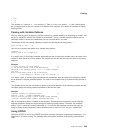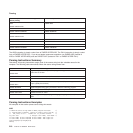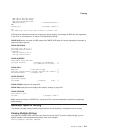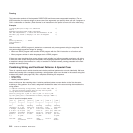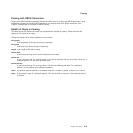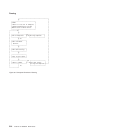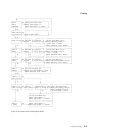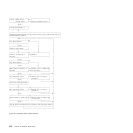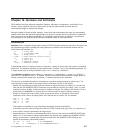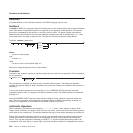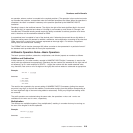This instruction consists of the keywords PARSE ARG and three comma-separated templates. (For an
ARG instruction, the source strings to parse come from arguments you specify when you call a program or
CALL a subroutine or function.) Each comma is an instruction to the parser to move on to the next string.
Example:
/* Parsing multiple strings in a subroutine */
num='3'
musketeers="Porthos Athos Aramis D'Artagnon"
CALL Sub num,musketeers /* Passes num and musketeers to sub */
SAY total; say fourth /* Displays: "4" and " D'Artagnon" */
EXIT
Sub:
parse arg subtotal,...fourth
total=subtotal+1
RETURN
Note that when a REXX program is started as a command, only one argument string is recognized. You
can pass multiple argument strings for parsing:
v When one REXX program calls another REXX program with the CALL instruction or a function call.
v When programs written in other languages start a REXX program.
If there are more templates than source strings, each variable in a leftover template receives a null string.
If there are more source strings than templates, the language processor ignores leftover source strings. If
a template is empty (two commas in a row) or contains no variable names, parsing proceeds to the next
template and source string.
Combining String and Positional Patterns: A Special Case
There is a special case in which absolute and relative positional patterns do not work identically. We have
shown how parsing with a template containing a string pattern skips over the data in the source string that
matches the pattern (see page 205). But a template containing the sequence:
v string pattern
v variable name
v relative positional pattern
does not skip over the matching data. A relative positional pattern moves relative to the first character
matching a string pattern. As a result, assignment includes the data in the source string that matches the
string pattern.
/* Template containing string pattern, then variable name, then */
/* relative positional pattern does not skip over any data. */
string='REstructured eXtended eXecutor'
parse var string var1 3 junk 'X' var2 +1 junk 'X' var3 +1 junk
say var1||var2||var3 /* Concatenates variables; displays: "REXX" */
Here is how this template works:
│var1 3│ │junk 'X'│ │var2 +1│ │junk 'X'│ │var3 +1 │ │ junk │
└───┬───┘ └───┬────┘ └───┬───┘ └────┬────┘ └───┬────┘ └──┬───┘
││││││
Put Starting Starting Starting Starting Starting
characters at 3, put with first with char─ with with char─
1 through characters 'X' put 1 acter after second 'X' acter
2 in var1. up to (not (+1) first 'X' put 1 (+1) after sec─
(Stopping including) character put up to character ond 'X'
point is first 'X' in var2. second 'X' in var3. put rest
3.) in junk. in junk. in junk.
var1='RE' junk= var2='X' junk= var3='X' junk=
'structured 'tended e' 'ecutor'
e'
Parsing
212
CICS TS for VSE/ESA: REXX Guide



